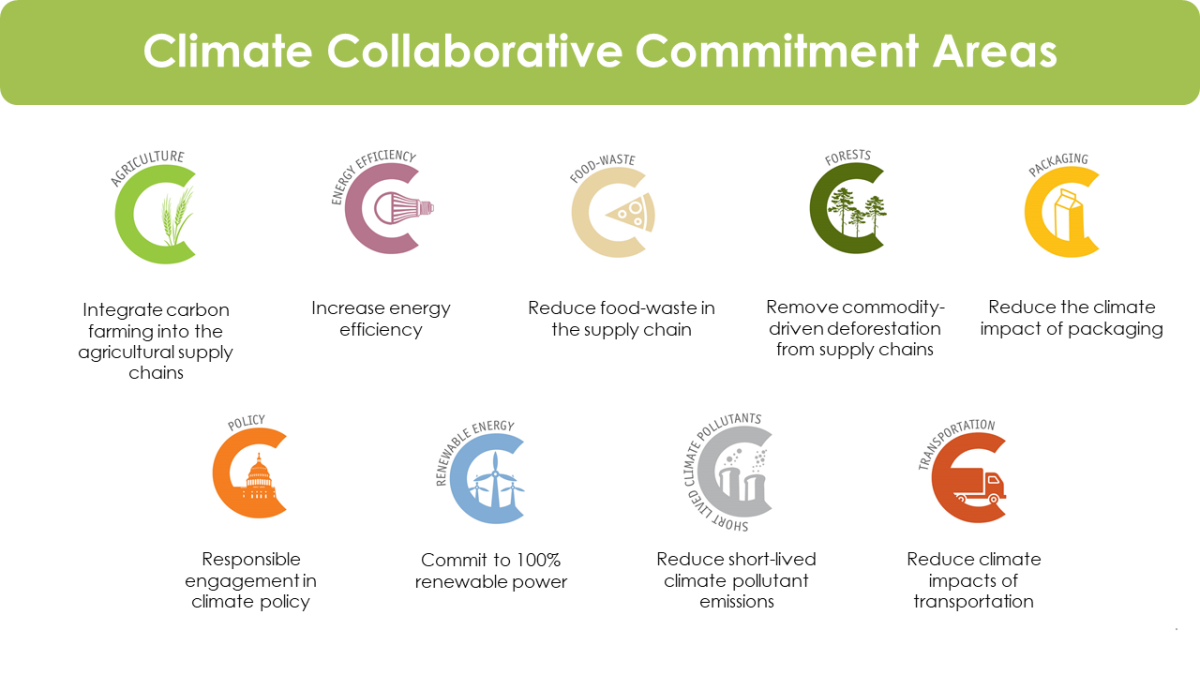Battling Climate Change Together
By Erin Callahan, Director of the Climate Collaborative

Taking on an issue like climate change alone is incredibly difficult, and when you add in the urgency and scale of the problem, and the complexity of modern corporate value chains, it quickly becomes impossible.
It’s why we launched the Climate Collaborative, a non-profit that brings food and agriculture companies together to work on climate solutions.
It’s also why I’m more hopeful than ever, a couple of years into our work, that the natural products industry can collectively succeed in creating a new way of doing business within the food sector.
Companies across the industry face a common set of challenges, and the opportunity to expedite and scale solutions by working together to address core issues they’re facing, from agriculture, to packaging, transportation, and more.
Annie’s was among our earliest participants in the project and committed to creating an industry-led path toward collaboration. Since then, we’ve been proud to work with General Mills and its other natural and organic brands, from EPIC Provisions to Cascadian Farm, LÄRABAR and more.
They recognized early on how much companies and their value chains had to learn from each other – starting at the farm level – and invested their time and resources into building a community for the whole industry.
General Mills knew this in part because they were already looking deep into their supply chains to see how they could collaborate on emissions reduction goals.
Most companies’ emissions are concentrated in their value chains – through growing and watering crops, storing them, transporting them, packaging them, and eventually disposing of them in the homes of customers – and so the emissions costs of not engaging suppliers and customers are high.
The food, and agriculture sector in particular, also has a huge opportunity to lead the way on responding to climate change.
This summer, the IPCC released its latest report, on climate change and land, which lays out clearly that agriculture, forestry and other land use are responsible for around one quarter (23%) of global human-caused greenhouse gas emissions.
One of the report’s key takeaways is the understanding that our agriculture and food systems are major drivers of emissions, but they also have huge potential as solutions to climate change.
Our goal at the Climate Collaborative is to give companies a roadmap toward these solutions – from carbon farming practices to packaging and food waste reductions, to switching to renewable energy and promoting sound climate policy.
We invite companies to make public commitments around a set of nine focus areas representing the key emissions drivers for the industry. Any company can act in these areas, regardless of what they’ve measured, or their resources, and then we provide assistance as they look toward implementation.
We launched two and a half years ago, and I’m heartened to see, that the momentum for action in this industry is only increasing.
In August alone, we had more than 40 companies make public commitments, more than in any other month since we launched. In total, 435 companies have made 1,679 public climate commitments – from farmers to distributors, brands, and retailers, truly representing the full industry supply chain.
We are encouraged by the progress on more than just the commitments.
We recently released the results of this year’s Tracking Progress Update, an annual assessment looking at the type and amount of progress that committed companies are making around their climate action commitments. This year’s results show that 71% of responding companies are making active progress against their commitments.
Over the next year, we’ll be working to enable all of these companies to go deeper in their goal-setting and actions.
Just in the last few months, we’ve worked to support hundreds of retailers in reducing food waste through a KeHE-sponsored food waste reduction project, we launched a climate consumer engagement working group, and we’ve hosted our regenerative agriculture working group, helping scores of brands go deeper in their carbon farming practices.
And last month, we were able to share General Mills work in this area – its new regenerative agriculture self-assessment tool, which builds on their ambitious commitment to advance regenerative agriculture practices on one million acres of farmland by 2030.
The bold, public approach General Mills has taken with its regenerative agriculture goal, combined with its work to create open-source models for peers to build on and adopt, is a strong example of the real progress our industry is making.
It’s vital we continue to inspire other companies to step up and follow suit, and set the bold, audacious goals that will lead toward industry innovation and problem solving at a scale. That’s going to help us reshape our industry’s approach to climate change.

